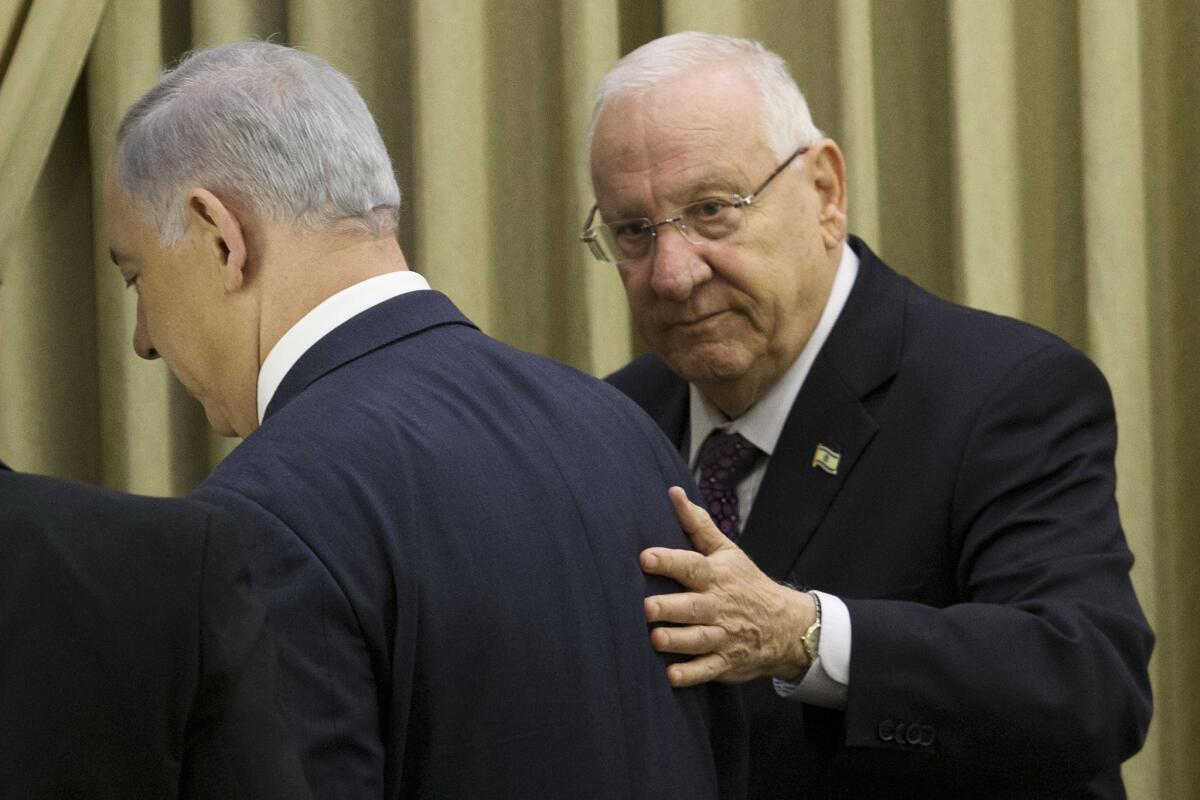Israel’s Netanyahu given 14 more days to form coalition government

Israeli President Reuven Rivlin, right, escorts Prime Minister
- Share via
Reporting from Jerusalem — Despite his decisive electoral victory in March, Israeli Prime Minister Benjamin Netanyahu is struggling to form a government and on Monday was granted an extension to complete negotiations for a new ruling coalition.
Since being tapped to put together the next government, Netanyahu has held talks with the five conservative parties he refers to as his “natural partners.” However, a month of negotiations have yet to yield an agreement with any of them to join a ruling coalition.
Netanyahu, who is seeking to form his fourth government since 1996, will have used the 28 days Israeli law allots a candidate for a first stab at securing a ruling coalition later this week. On Monday, he asked President Reuven Rivlin for the maximum legal extension of another 14 days, taking him to May 7.
Failure to form a government after that could result in one of his political rivals being asked to try or even result in new elections, though the latter is far less likely.
------------
FOR THE RECORD
12:15 p.m.: An earlier version of this article stated that holding new elections in Israel is considered far less unlikely than one of Prime Minister Benjamin Netanyahu’s political rivals being asked to try to form a new government. It is considered far less likely.
------------
Netanyahu is pursuing a government with hawkish, religious and centrist parties that will give him a coalition representing at least 61 members of Israel’s 120-seat parliament, or Knesset, though he hopes for the more comfortable backing of 67 lawmakers. His Likud party won 30 seats.
Negotiations focus on reconciling conflicting demands and ideologies on a wide range of issues such as the settlements in the West Bank and East Jerusalem: policies on religion and economy; and the division of coveted appointments and the posts’ budgets.
The deadline pressure on Netanyahu could drive up the political price demanded by each of his potential partners. He needs all five for a solid majority of 67 seats that would give his coalition a chance of surviving longer than his recent government, which collapsed after less than two years.
In theory, the conservative Netanyahu still has the option to form a national unity government with opposition leader Isaac Herzog and his dovish Zionist Union party. Such a coalition could provide Israel with a more moderate face to show the international community, but both leaders have strongly rejected it as an unrealistic option.
“We have made progress and are on the way to forming a government,” Netanyahu told Rivlin on Monday.
Rivlin urged the prime minister to form a government as soon as possible to restore political stability. The new Knesset elected last month has already been sworn in and Netanyahu’s previous cabinet remains in place until it will be replaced with a new one that will be approved by the Knesset.
Sobelman is a special correspondent.
More to Read
Sign up for Essential California
The most important California stories and recommendations in your inbox every morning.
You may occasionally receive promotional content from the Los Angeles Times.













